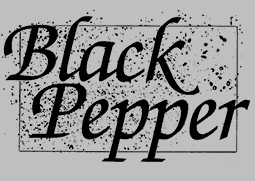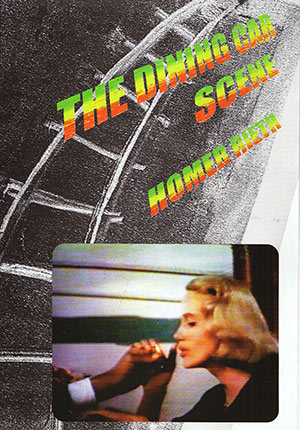 |
The Dining Car Scene : Homer Reith |
||||||||
Book Description Thornhill
strikes a customized match
suavely; from a matchbook; she leans forward, into the flame, takes his hand, with the match in it... Brian Edwards has said
that
Homer Rieth’s poems are ‘markers of the
culture’. The title poem in The
Dining Car Scene, taken from Hitchcock’s North by Northwest,
previews his
approach. He presents an incident, a landscape, a book remembered, or
the occasions of love or death, crisply and directly. Then he
effortlessly goes further: he invites us into a meditation on earthly
life and what it may mean. An entire period, Carlton in the Seventies,
comes under his celebratory and critical eye, in his longer tour de force
‘Siberia’. And he
does the delicate lyric.
Any poet who enchants, writing of the outer suburb of Mount Waverley, or the music of Vaughan Williams, clearly has the skills. Homer Rieth’s first collection has been long awaited. The collection was shortlisted for the 2002 Adelaide Festival Awards for Literature. ISBN 1876044322 Published 2001 58 pgs $19.95 |
|||||||||
Book Sample
Reviews Poetry from Black Pepper Melbourne Elegies, Bread, Russian Ink, The Dining Car Scene Brian Edwards Mattoid, No. 55, 2006 Homer Rieth’s The Dining Car Scene is extremely impressive. The immediately obvious richness of his poetry comes from combinations of sharp ‘local’ detail and an erudite field of reference informed always by his special feeling for the resources of language itself. Provocatively metaphoric, lyrical and romantic, these poems invite listening and rereading.
As a tribute to Hitchcock’s North By Northwest,
the 1959 thriller
with Cary Grant and Eva Marie Saint in the leading roles, the title
poem intermingles recollection and analysis. With precise details
setting the scene, and with the poet become both director and critic,
we are reminded, as well, and economically, about the larger narrative
of which it is part and about the world beyond the dining car. As film
characters. Eve and Thornhill may be symbolic figures played by actors,
but in its precise attention to the scene’s careful
construction
(to position, gesture, music, and lighting), the poem invites us to
participate, again, in another mode of interplay between art and life,
artifice and reality, and in ways that remind us that such distinctions
are not so simple. As its replay demonstrates, our responses to art are
emotional and intellectual; and the process of making connections and
meanings is its own reminder not only of the complexities of
involvement but also that the borders are down:
across their table, through the dining car window
you can see the soft dissolves of sunset, river and mountain scenery, the milestones of another journey. Later, after betrayal has left its wound, you will remember all this
As the train moves through its landscape, with driver Hitchcock in
control, the viewer (now poet) is simultaneously in and out of the
scene, compelled by its dynamics to review its significance and to
transcend its moment.
The local is precious and Homer Rieth invests it with special significance. In ‘Found Objects,’ it is not only the sculptor’s transformative vision that is valuable, the talent that turns enamelled tin and copper wire into a grand piano, but also a profound sharing ‘as if suddenly tea was no longer an evening meal/but provisions for a journey into a maze.’ In these poems late autumn in Melbourne is celebrated in fondly detailed rituals at The Francis; ‘Perceval’s Yellow Painted Ship at Williamstown’ becomes a smorgasboard of vegetables, literary reference and waterside work; falling for love can bring regrets ‘like reading Herodotus with a hangover;’ a patch of country Victoria is evoked in laconic images and stuff of dreaming; and in the gold country of Ballarat’s layered history, a ‘leather-bound Utolff Beethoven’ prompts thoughts not only of the great composer but also ‘all who fell on Bakery Hill.’ There are many sources of enchantment in this collection. For me, the stand-out piece is ‘Siberia,’ a long poem that works through so many different registers. Its provocative blend of landscape and cultural reference creates Siberia as not only a place but also a state of mind. What does the word evoke? ‘You mustn’t believe everything they tell you / about Siberia, comrade.’ Concessions to images of vast distances, cold and human suffering are followed by:
In Siberia the spider weaves his cosmic web
in the ministry of the Milky Way the icon of the madonna is kissed by passing asteroids the Venusians beam faint signals to the voyager who’ll never come home
In this territory ‘you have to remember Siberia was the end
of
the line / before the line was ever drawn.’ A finely felt
tribute
to Yevtushenko leads to ‘little boy little poet / you knew
even
then/in the end / we’re all Siberians’ which itself
leads
into a statement of community, a people’s collective that
allows
‘Siberia’ a place in Melbourne with the messages
coming in,
as well, ‘from Nantucket to Ben Bulben’:
The society of poets is a freemasonry of the word
the months passed into a paroxysm of years spring gave way to winter and no one thought it strange the word was made flesh at Naughton’s where philosophers met to talk of truth and beauty at Jimmy Watson’s wine bar east of the Urals at Irkutsk north to Lake Baikal The Albion Hotel like kings wisely following an unlikely star poets passed their secrets along the underground like delicate incendiary devices
Here the litany of place names documents a social history (the Pram
Factory, Johnny’s Green Room, the Yarra, Punt Road Hill,
Festival
Hall...) that incorporates memories across time and place and is lit
with the revolutionary fervour of poets at the barricades, a community
who share drinks and moments and who cry out against atrocity.
Declamatory and gentle, nostalgic, insistent, passionate and
occasionally comic, this is a great poem.
Against a history of appalling abuse, terror and death, it offers
community, sharing and of course, the words of poets.
These are interesting collections. Black Pepper continues to present writing that warrants attention. The Dining Car Scene Tim Thome Famous Reporter, No. 24, December 2001 The town of Minyip in Victoria’s Wimmera district is small, flat, tired and doesn’t at first glance seem to have much going for it, but among its population, barely large enough to keep both its pubs in business, are two remarkably gifted poets. Eric Beach’s work, both in print and in performance, is well known to most Famous Reporter readers, and, to be fair, he has lived in Melbourne, Adelaide and Hobart for considerably longer than in Minyip, but not as well known is the poetry of Homer Rieth. The Dining Car Scene reveals Rieth as a perceptive and talented observer of the details of Australian life, rural, urban and suburban, but beyond that as a chronicler of the human condition in a wider geographical, historical and cultural context. His long poem, ‘Siberia’ which is the most significant piece in the collection, moves effortlessly between the imagined (or imaginatively received) landscapes of Yevtushenko, Tolstoy and Solzhenytsin and the wine bars of Carlton. Melbourne’s Festival Hall, where both Yevtushenko and Johnny Famechon have performed, becomes a metaphorical venue for the convergence between poetry and pugilism. The spirit of the 1960s poetry scene in Australia is summed up in the line, ‘We got the trans-Siberian to Sydney’. In a rather different vein ‘Fairy Penguins’ is a wry piece not so much on the effects of the Low Head oil slick as on the role of other species as ‘a slow / and easy catch for tomorrow’s headlines’. In fact, for all that Rieth comes across as very much the suburban poet, the poet of laburnums, golf, Tupperware and thinking about Duns Scotus in the back yard, he has a very interesting take on ‘nature’. Some of my favourite passages in the book are those where he deals with ‘the sheer amazingness of animals’ (or of plants or minerals). Even thrip, slugs and snails are vividly evoked, while his intense scrutiny of green walnuts on the tree or the way ‘the light / prickles the sugar gums’ demonstrates a willingness to observe closely in order the more interestingly to transform what is observed into art. And yet he is also excellent when dealing with people. The moving ‘Requiem’ makes this reader believe that he not only knows but loves the subject, an old man dying in hospital whose ‘neat hand had crossed a good thing in the last’. The paean for his lover, ‘the sort who’ll die with her Doc Martens on,’ who ‘can roll a tin of tea in her sleep’ with a similar clarity evokes both a character and a relationship. Among the most convincing passages are those that are set in the suburbs and country towns where ‘the street lamps have found a good line and length’ or where one is made to wonder ‘how much pressed ceiling roses / remember’. His ‘Twenty Fifth of April’ gains its strength as a poem about Anzac Day as much through being set where ‘the trenches meet the suburbs’ as from his calling up of images redolent of military nostalgia. Above all, what I really like about Rieth’s poetry is its scope. He can contemplate a culvert, a toolshed or a nun and create memorable poetry from the contemplation, can apply parodies of well-known advertising slogans to war in a witty and timely piece, and can celebrate a world where the interaction between humanity and the environment is a fruitful source of images and ideas, not just a simplistic battleground. The Dining Car Scene Imago, Vol. 13, No. 2, 2001 Homer Rieth’s poems, in The Dining Car Scene, are far less complex than those of Hammial [Bread]. They are about moments captured in time by one medium or another - in the title poem by a camera shot in a Hitchcock film - and laid out in detail, real, associated or imagined, and comparative. One has the impression of Rieth walking through streets, through the countryside, through the literature and personae of other countries, with his eyes wide open, taking note of the finer points that go to make up those surroundings and giving them equal place and significance with the large and obvious. There are three longer poems, that is of over two pages, the longest being ‘Siberia’, which deals with the various conceptual deserts, or places of the lost, created as a metaphor to the real Siberia. ‘In the end we’re all Siberians’; ‘Siberia your frontiers never end!’; and ‘Wherever you go Siberia’s waiting for you’. Mostly these are reflective poems, although a shaft of irony shoots out in a few, such as ‘War’ which satirises not only the place war holds in our society but also the clichés that surround our attitude to it and to the society that can produce it. | |||||||||

